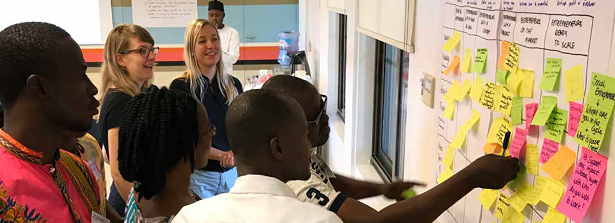Leveraging embassy food security programmes with social enterprise opportunities

Wageningen University & Research, United Nations Institute for Training and Research (UNITAR) and SESInc. have completed a report on the potential contribution of social entrepreneurship to Dutch embassy (EKN) programmes in the field of Food and Nutrition Security (FNS) and on the added value of the SES4Food programme for the embassies’ FNS goals.
A desk study of relevant Dutch FNS programmes, interviews, focus group discussions and an interactive workshop in three targeted Netherlands partner countries, Ethiopia, Uganda and Benin, have taken place. EKN and programme staff, support organizations, market actors (buyers), investors and entrepreneurs were involved.
The study gives interested Dutch embassies with FNS programmes better insight in the added value of social entrepreneurship to embassy programmes and the potential of the SES4Food programme to increase the impact of their current FNS programmes that focus on small and medium entrepreneurship, young entrepreneurs, farmers and women.
The report shows that consulted sources see several pathways in which social entrepreneurs have the potential to contribute to FNS impact. Explicitly integrating more social entrepreneurs to FNS programmes can contribute to impact in terms of the number of people lifted out of undernourishment, number of family farms that doubled their productivity and/or income, and number of hectares of farmland converted to sustainable use. In addition to this and because of the flexible nature of their structure, social enterprises tend to be adaptable, which is important to react to emerging trends and technological opportunities. Social entrepreneurs expressed their need for various forms of support to contribute to this impact.
The SES4Food programme can deliver this support and provide an offline structure and online tools to monitor the development of the social entrepreneurs and measure their impact. The programme is perceived by respondents to potentially contribute to leverage FNS programmes by its ecosystem approach: a digital platform, mapping and connecting the not yet linked, developing coalitions of entrepreneurs within the food chain, and evoking orientation of support programmes to needs that entrepreneurs can express via this platform. For social entrepreneurs, it can add value to become connected to relevant support and help them to get access to finance. The report strongly recommends SES4Food to align with what is already in place and tailor the programme to the local situations.
As follow-up, the SES4Food programme manager has proposed the way forward on how to integrate SES4Food in the FNS programmes in the three concerned countries. For Ghana and Ethiopia, an exploration workshop is suggested. Jointly, the possible effects of strengthening networks should be explored and the available support mapped out. In Benin, a focus geographic area should be established, together with agribusiness programmes after which LinkingPins should be trained and the mapping exercise can take place.
Or leaf through the online booklet version.






